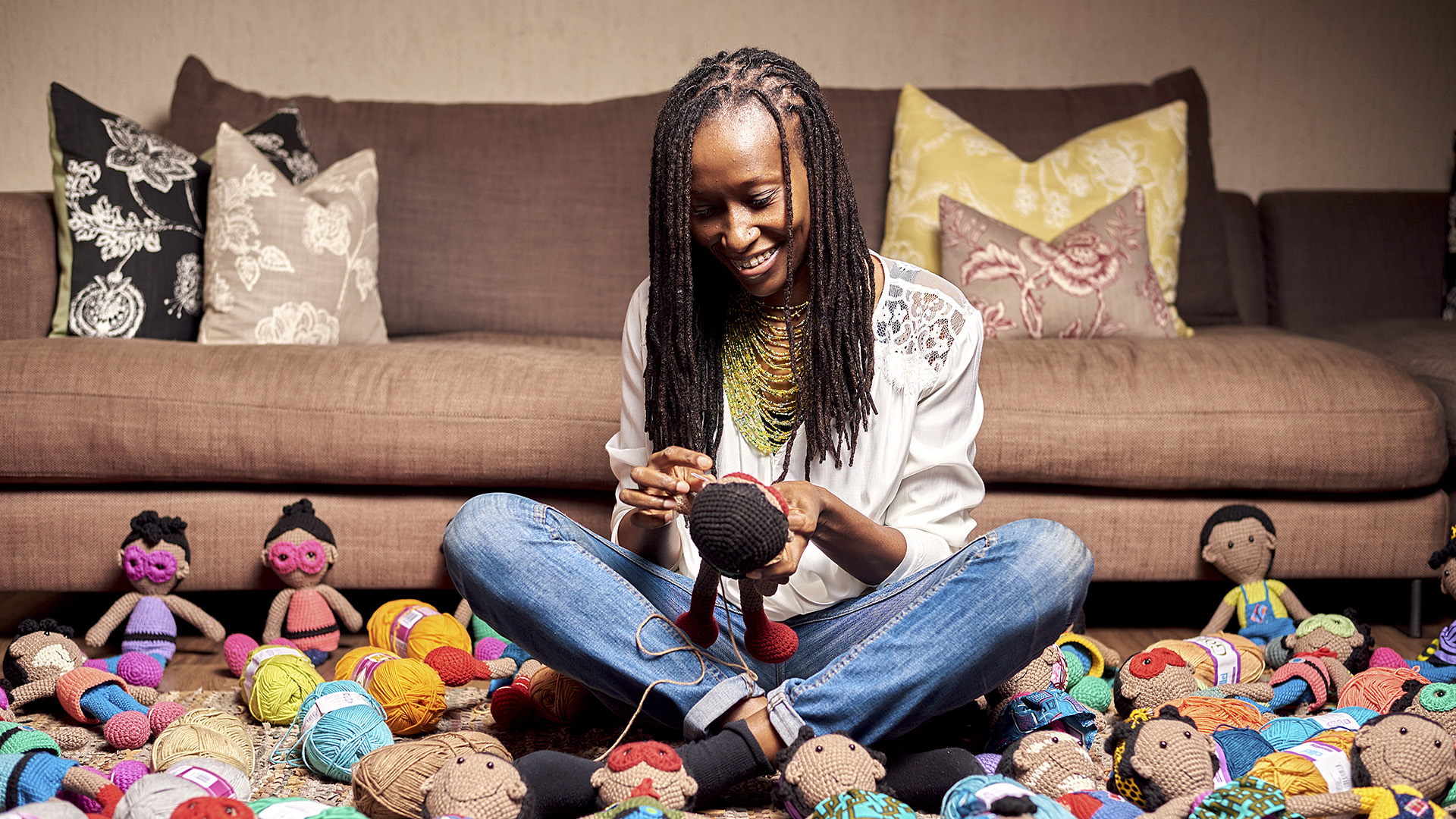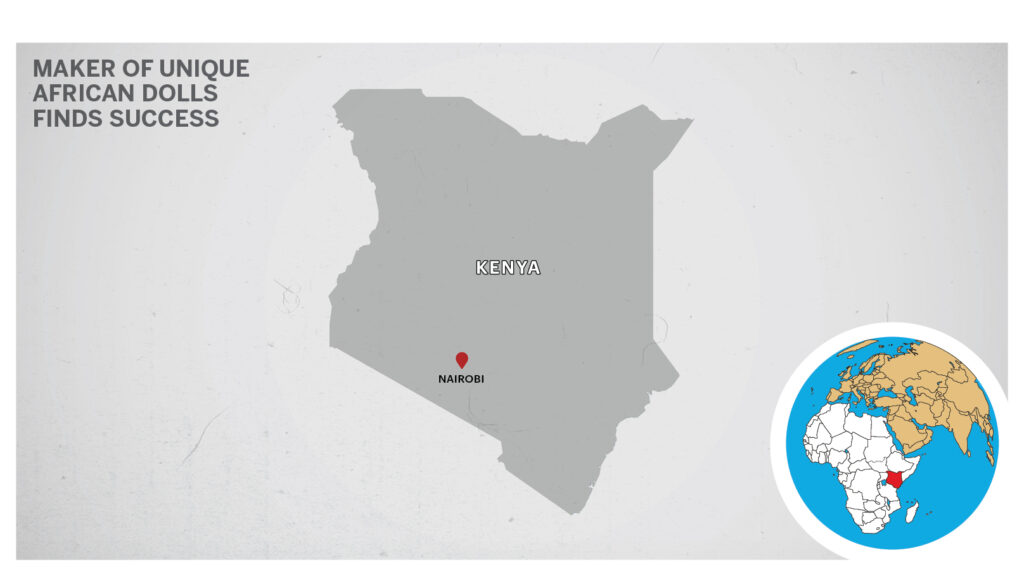

NAIROBI, Kenya — Three months after her son, Kiragu Kamau, was born in 2008, Anne Wangari Kamau, 44, realized that he did not have a comfort toy and gifted him one of her elder daughter’s teddy bears called “Teddy”, which she knitted.
Over time, the bond between her son and Teddy grew, and the two became inseparable.
“Thirteen years later, Teddy is still a huge part of our family, and with my crochet skills, I knew what I wanted to do — knit other Teddies for children across the world,” Wangari told Zenger News.
That Eureka moment was the inspiration behind Rafiki Toys by Umba Creations. Rafiki means “friend”, and Umba means “create” in Kiswahili.
Umba Creations, she said, seeks to build a “socially conscious” children’s brand called Rafiki Values Tribe.

Before embarking on her entrepreneurial journey, Wangari spent over 15 years working in various multinational companies’ marketing and creative departments.
“My last corporate role was at Oracle Corporation, where I headed the marketing for East and West Africa.”
Umba Creations focuses on handmade products with a particular interest in creating dolls and toys, which impart positive messaging and values in the lives of children.
“I have always been creative, and I knew that I wanted to use my hands to create things. But, for a long time, I felt like I was ‘trapped,’ not fully living my authentic self.”
Wangari started her creative journey at Evelyn School of Design in Nairobi, Kenya, before proceeding to the United Kingdom, where she acquired a degree in Interdisciplinary Design from Oxford Brookes University.
Umba Creation’s product line comprises two main dolls: The Rafiki Mwenzi Girl Doll and The Rafiki Wema Boy Doll.
“We offer these two dolls as superhero dolls, which remind children that their superpowers lie in the things that they do and say.”

They also have a wide range of diversely made dolls, which teach children about diversity and embrace their uniqueness and differences.
“The dolls come in different forms: dolls for disabled children; dolls with vitiligo or those dolls celebrating the beauty in albinism.”
The dolls cost between Sh1,200 ($11.13) and Sh1,800 ($16.70), she said.
“In a good month, we can sell 100-120 pieces. However, the global challenges brought by Covid-19 have cut our sales by 70 percent. But are working on exploring the digital marketing space.”
She started production with two women full-time and was looking to add two more when Covid-19 struck and sales plummeted.
“The women were producing faster than l could sell, so I had to release one,” Wangari told Zenger News.
The one lady left comes on a part-time basis.

“There are long periods when there is no work. This is challenging as the ladies have depended on the business for their income.
Wangari said that most of their customers are expatriates and Kenyans looking for unique handmade, locally made products.
“The expatriates looking for unique Kenyan souvenirs to take back to their countries usually buy from us through our social media platforms. Some also buy the dolls when we occasionally sell them at the local handmade craft markets,” she told Zenger News.
Last year, Umba Creations launched children’s playing cards dubbed Rafiki Values Tribe, and a jigsaw puzzle spun off from the dolls.
“Our story is that within each doll lives a tribe of values, which have been passed on from one generation to the next. We wanted to bring these values to life by passing on the core value messages through creative yet fun play, hence the cards and puzzle,” she told Zenger News.
Umba Creations dolls, which are delicately handmade with yarn imported from South Africa, appeal to local and international markets.

They have an online shop on Etsy, an online marketplace for handmade goods. She said most of her international clients are based in the United States and a few in Europe.
“I love the designs and quality of work,” Nikki Zigmund, a customer based in Nairobi, told Zenger News. “Everyone we have gifted these dolls loves them, too. I think that the fact that the dolls celebrate diversity is such a great message for children.”
Wangari has an outlet in Nairobi for the dolls though most customers contact her social media accounts, such as Instagram, Facebook, and WhatsApp, for both local and international orders.
“We can keep tabs on our clientele and create personal relationships with them from the reviews on Google and the comments from our international customers on my Etsy shop.”
Wangari plans to build a funky children’s brand that supports parents and guardians in their parenting and which children will look back when older and say that Rafiki Values Tribe played a part in their childhood.

“I like the value system behind the brand,” Stacey Achieng, another customer based in Nairobi, told Zenger News.
“I think they are important values for parents to instill in their kids. I also love the diversity and inclusivity of the dolls. When kids play with dolls that look like them, it helps their personal development.”
(Edited by Kipchumba Some and Anindita Ghosh. Map by Urvashi Makwana)
The post Kenyan Woman Quits Lucrative Oracle Job, Finds Success In African Dolls Business appeared first on Zenger News.




